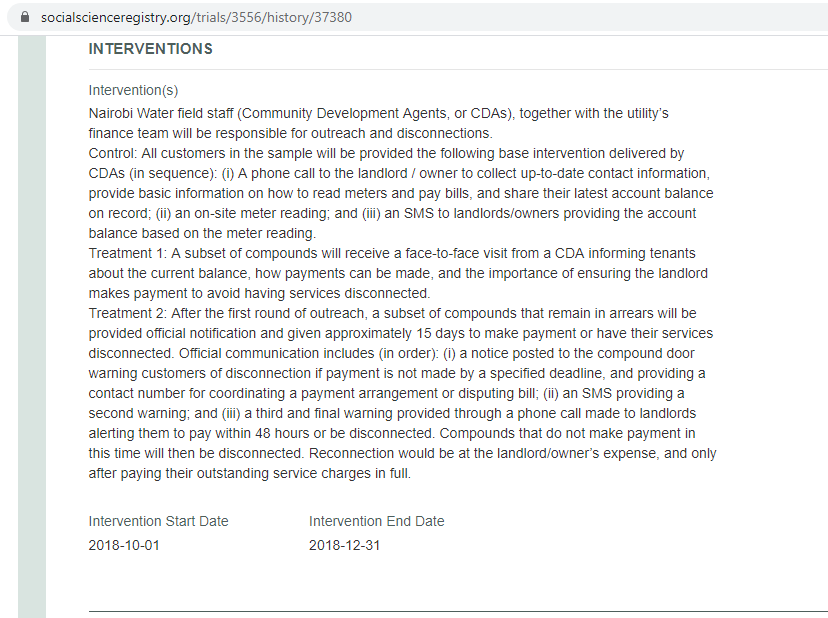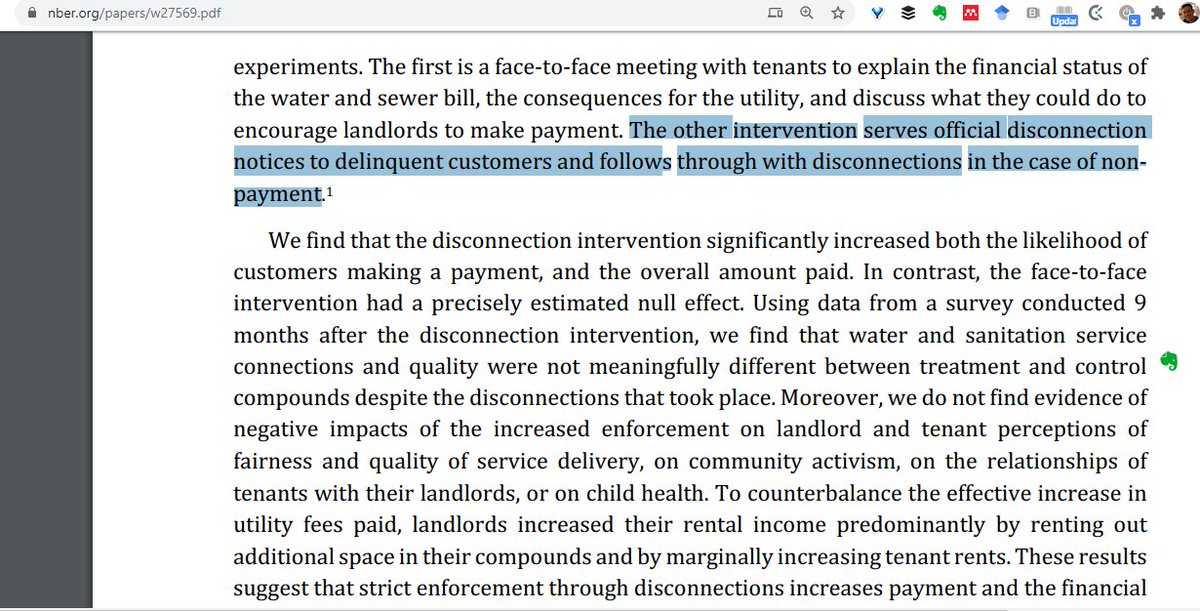Under absolutely no circumstances are this field experiment and the associated paper ethically justifiable. Not even under utilitarian terms given the actual harm imposed on subjects. Households in an African country lost access to water for up to 9 months. How is this ethical? https://twitter.com/joshbudlender/status/1292170843389386761
It took some sleuthing because the link to the registry does not work, but here is the AEA RCT regstry entry: https://www.socialscienceregistry.org/trials/3556
To note: the actual intervention IS disconnection. This is an intervention that DOES cause harm.
To note: the actual intervention IS disconnection. This is an intervention that DOES cause harm.
This is so fucked up. The experimental design DOES clearly and explicitly establish that they were going to disconnect people from their water supply. So many were outraged by disconnections in Detroit (in the USA). Why aren't they outraged by disconnections in Nairobi's slums?
They cleared IRB but not Maryland's nor Berkeley's.
(this link does not provide access to the actual text of the IRB documentation, which I think should be made publicly available)
(this link does not provide access to the actual text of the IRB documentation, which I think should be made publicly available)
You can download the paper here https://www.nber.org/papers/w27569.pdf and judge for yourselves.
(Side note: I'm really pissed off, I have absolutely no emotional bandwidth nor time to look at this in detail, but since it falls squarely in my research interests and methods, here I am).
(Side note: I'm really pissed off, I have absolutely no emotional bandwidth nor time to look at this in detail, but since it falls squarely in my research interests and methods, here I am).
This is incredibly fucked up. The authors KNOW that the city of Nairobi is reluctant to cut service off because of lack of money to pay, and STILL devised an intervention where they pushed the utility to cut those households.
How did anyone on the planet think this is ok?
How did anyone on the planet think this is ok?
To these authors, it's ok not only that a large number of households were disconnected, but ALSO that they were disconnected for NINE MONTHS.
(I read the entire paper, yes, and at no point does it say that there is informed consent for this intervention).
(I read the entire paper, yes, and at no point does it say that there is informed consent for this intervention).
The fact that the city of Nairobi approved of this study does not constitute informed consent by the households treated. This study actually, effectively created harm in households to test a regulatory policy instrument.
The authors are opposed to a "rights based approach" ...
The authors are opposed to a "rights based approach" ...
I want to see the IRB and I want to see how they justified intervening households. The paper clearly says: the water utility would not disconnect for fear of negative political outcomes (to note: activism for the right to water is NOT a "negative political outcome").
UPDATES https://twitter.com/raulpacheco/status/1292410206694051840 AND https://twitter.com/raulpacheco/status/1292412052963762176
UPDATE - Authors' response. I particularly appreciate these paragraphs that make it clear that the concerns raised were important. Ethical, practical and policy implications and questions remain, but this response is much welcomed.
https://twitter.com/paul_gertler/status/1292341505051381761
https://twitter.com/paul_gertler/status/1292341505051381761
I may have pointed to the EARLIER response. This is version 2.0 https://twitter.com/paul_gertler/status/1292353595526979586
A thread on the ethics of doing fieldwork in vulnerable communities and the importance of decolonizing research methodologies (links to abundant scholarship on this topic) https://twitter.com/raulpacheco/status/1292432569883979776

 Read on Twitter
Read on Twitter








